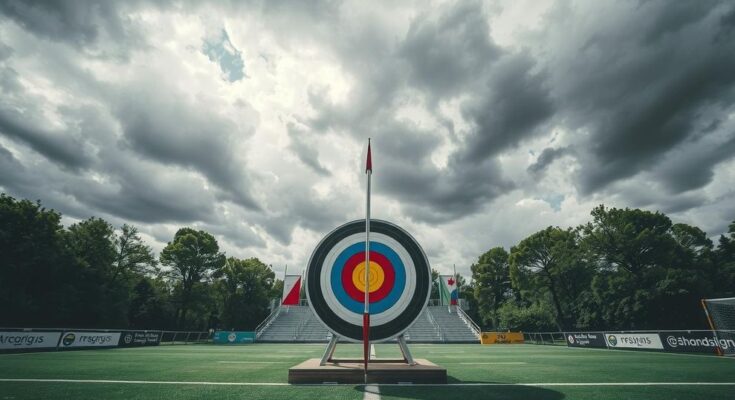The leadership crisis within Nigeria Archery Federation hinders the aspirations of archers like Damilola Sholademi, a national champion unable to compete internationally due to bureaucratic issues. Allegations of electoral malpractice against NAFED President Mohammed Abdullahi and criticisms of governance practices have further complicated the situation. Calls for reform and grassroots development are essential for the sport’s future in Nigeria.
Damilola Sholademi, a prominent member of the Nigerian National Archery Team and a champion at the USA Archery Indoor National Championship, faces a significant barrier in pursuing international competition—bureaucratic inefficiencies. Despite earning 14 medals over the past year, he cannot represent Nigeria because the Nigeria Archery Federation (NAFED) is not in good standing with World Archery due to administrative issues.
Recognized as a sport of great potential, archery in Nigeria struggles under the governance of NAFED President Mohammed Abdullahi, who has held his position for nearly ten years. Allegations of electoral manipulation surrounding his continued leadership have arisen, with accusations that congresses were held in such a way as to limit participation and control outcomes.
Abdullahi refutes these claims, stating that his leadership was instrumental in establishing a structured archery framework in Nigeria, mentioning that his administration managed to secure equipment donations and reintegrate with the Nigerian Olympic Committee. However, former NAFED Secretary Olugbenga Boluji argues that irregularities plagued the electoral process, with video evidence suggesting that only a small number of legitimate members attended the election, leading to its annulment by World Archery.
Critics, including Boluji, have raised concerns about the absence of an active governing board, which is supposed to oversee governance according to NAFED’s constitution. Allegations also exist regarding the appointment of individuals with no history in archery as voting delegates, raising questions about the legitimacy of the electoral process and decisions made.
Many stakeholders express disappointment over the federation’s failure to prioritize grassroots development, with archery largely absent from activities in the 36 states outside the Federal Capital Territory (FCT). Boluji points out that despite efforts to integrate archery into national sporting events, the federation has remained inactive, causing the sport to remain marginalized.
Recognizing the critical state of affairs, World Archery has refused to accept the results from the March 2024 NAFED congress, citing electoral inconsistencies and calling for oversight by the Nigeria Olympic Committee. A roadmap has been suggested for reconciling the situation, proposing provisional acceptance of the March election results until a general assembly in 2025, during which further evaluations will be undertaken.
NAFED’s 2025 Annual General Meeting is set for March 10, alongside the National Individual Open Archery Championship, but there are concerns about whether the meeting will effectively address longstanding grievances or simply solidify Abdullahi’s control.
Discontent among stakeholders remains, with many advocating for a complete overhaul of NAFED’s leadership to restore the sport’s integrity. Sholademi’s aspirations hang in the balance, as he expresses concerns over potential biases in the upcoming elections due to overlapping affiliations within the Nigerian Olympic Committee. As Nigeria’s most awarded archer, he emphasizes, “We have the talent. We just need the system to work for us.”
The leadership crisis within the Nigeria Archery Federation is significantly impacting the aspirations and opportunities of Nigerian archers. With bureaucratic inefficiencies hampering international representation and allegations of electoral misconduct clouding governance, the sport’s future hinges on resolving these issues. Stakeholders advocate for a comprehensive leadership overhaul and the establishment of transparent processes to ensure fair representation and development of archery across Nigeria.
Original Source: www.premiumtimesng.com




